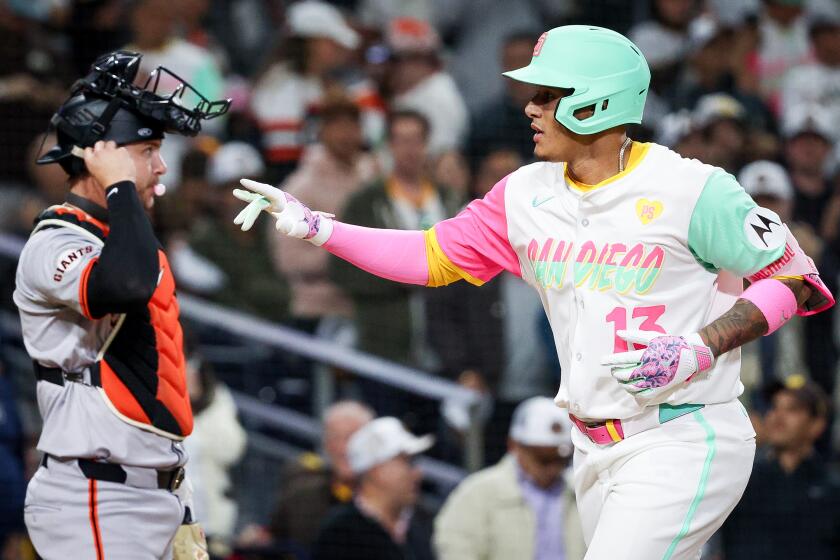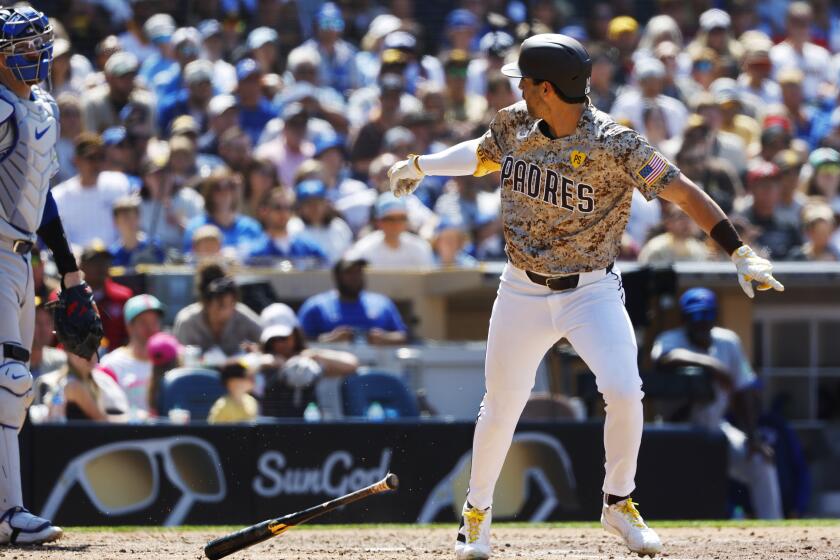Chargers haven’t been complementary
If you want to understand the Chargers’ midseason spinout, look not just at how they are playing but at how they’re not playing off each other.
The Chargers are battling themselves, not the officials. They’re in their own way as much as their opponents. On the field, they’ve gone from finely a tuned automobile to a bumper car. They’re holding down rather than lifting up.
Many of us still don’t understand why Andre Caldwell’s fumble was overturned on that kickoff in Denver, the replay review reversal robbing the Chargers of a chance to take over 28 yards from what would have been a go-ahead touchdown late in the first half.
The result of that play is as frustrating as it is irrelevant. That call is not why the Chargers lost a second straight game.
For a play that more wholly explains why the Chargers are on the verge of crisis going into Sunday’s game against the Miami Dolphins, when virtually everything had been going their way for five weeks prior, look at a drive earlier in that Broncos game.
The drive ended in Denver’s second punt in two possessions, a seeming triumph for the Chargers. But one seemingly innocuous play within that drive crucially set the game on a course the Chargers couldn’t survive.
After starting on their 12-yard line and converting a third-and-1, the Broncos lined up at their 31 needing four yards to go on another third down. A stop would give the Chargers the ball with decent field position, likely beyond their 30. Instead, Demaryius Thomas spun away from Shareece Wright, caught a pass with no one around him and wasn’t pushed out of bounds until the 47-yard line.
The Broncos would punt three plays later, but from midfield. The Chargers would start from their 14, go three-and-out and give the ball back to the Broncos at the Denver 31.
The field position battle had been lost. It would never be won back.
Yes, Philip Rivers has been mortal the past two games after sustaining a level of excellence that by some measures was unprecedented. Yes, the Chargers’ defense allowed 106 yards more per game in the losses to Kansas City and Denver than it allowed over the five straight victories that preceded them.
But those factors alone don’t herald certain defeat.
The problem here is not that the Chargers aren’t perfect. It’s that the Chargers aren’t complementary. The offense isn’t coming through after the defense fails. The defense isn’t making enough stops to allow the offense to get going in manageable situations. The kick coverage teams are spotting opponents bonus yards.
The Chargers weren’t flawless in their five victories. What they did much more often than not was play perfectly together.
“That’s the mark of a good team,” safety Eric Weddle said. “The last couple weeks we just haven’t played at a high level like that . . . We’ve got to get back to what we do – playing complementary football.”
What does that look like?
Consider the first half of the Jacksonville game, when the offense produced just enough until the defense got going.
The Jaguars took a 7-3 lead. The Chargers offense answered back to take a 10-7 lead on the next drive. The Jaguars scored another touchdown. The Chargers punted. Then their defense got a three-and-out. The Chargers drove to take a 17-4 lead just before the half and then scored another touchdown to start the third quarter. The Jaguars didn’t score again.
Perhaps the statistic that best illuminates how a surging team skidded is the average starting point of possessions. Chargers opponents’ average starting point was the 23-yard line during the five-game winning streak. It is the 28 the past two games. The Chargers’ average starting point the past two weeks has been the 22. It was nine yards better in the previous five games.
This is explained in large part by plays such as the one described above in Denver. Even when they force a punt , the Chargers’ defense often isn’t getting off the field as quickly. Denver and Kansas City combined to convert 15 of their 27 third downs (55.5 percent). The Chargers held their previous five opponents to a 44.3 percent conversation rate (27-for-61). Just as telling, the Chargers allowed just 16 drives of six plays or more in their five-game win streak. The Chiefs and Broncos went six plays or more on 14 of 21 drives.
Specials teams, too, has played a giant role in the Chargers going from complementary to contrary.
Seattle, Buffalo, Jacksonville, New York and Oakland returned a total of five punts for 35 yards and averaged 19.2 yards on 17 kickoff returns in their losses to the Chargers. Kansas City and Denver had 65 yards on five punt returns and averaged 22.2 yards on seven kickoff returns.
Certainly, most every stat can be applied to complementary football. But field position is where it shows up.
Another key flip-flop has been turnovers. The Chargers took the ball away seven times and gave it away once in their win streak. They’ve lost the ball three times and not taken it away in the two-game slide.
“That’s the winning formula,” Philip Rivers said when it was pointed out how the Chargers’ field position and ball control fortunes were so disparate between the winning and losing streak. “. . . That’s how you win. The last two we haven’t done that as well. We’ve had stretches but just not as well . . . We have to get back to that. No better time than Sunday.”
In order to be 6-3 going into the bye, the Chargers will have to be complementary.






